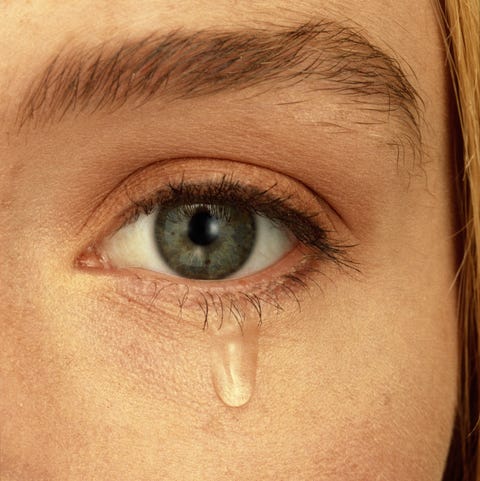The Real Reason Some People Cry After Having Sex It's called postcoital dysphoria, and it's more common than you think. image By Korin Miller Oct 26, 2018 Close-up of woman's face with teardrop falling from eyeGETTY IMAGESPAUL DANCE ( courtecy;- prevention )
The Real Reason Some People Cry After Having Sex
It's called postcoital dysphoria, and it's more common than you think.
In a perfect world you’d orgasm during sex and spend the aftermath reveling in the afterglow with your partner. But in reality, some women immediately dissolve into tears after they finish. This is also known as postcoital dysphoria.
That’s happened to Michelle Curtis, author of the blog Sex After Marriage, more than a few times. “I feel the emotions start bubbling up, and if I feel safe in the environment, I’ll cry,” she says. “I’ll just start bawling.”
But Curtis explains that she’s not in any pain in the moment. “It’s just an emotional release I get.” In general, Curtis says she tends to cry a lot in many different situations. “That’s how I deal with sadness and happiness,” she says. “I’m not adverse to crying. Doing it during sex, it’s just another way of expressing myself.” So why do some people start tearing up after sex while others keep it together? We asked some relationship therapists to explain.
Crying during sex is more common than you think
Research has found that nearly half of women and 40 percent of men have cried after sex at some point in their lives. As for why this happens, “no one really knows for sure,” says sex educator Kait Scalisi, MPH, founder of Passion by Kait.
However, there are a few theories. One is that people have a rush of the love hormone oxytocin in their bodies after they orgasm. Couple that with the physical and mental release of orgasming, and it can be overwhelming, says Debra Laino, a board-certified relationship therapist.
Sex can also make someone feel really vulnerable, and the intimacy that comes with the act “brings up lots of emotions,” Scalisi says. And then there’s something known as a “crymax.” “Sometimes, the sex and orgasm are so good, it leaves you crying,” Scalisi says.
While it’s possible to cry after sex as a form of release or any of the other things we mentioned above, it can sometimes be linked to a mental health condition. One recent survey of 1,800 women found a link between crying after sex and postpartum depression. “Having a history of trauma may or may not play a role,” Scalisi says. However, she adds, “anyone can experience crying after sex.”
If you start crying after sex, don't beat yourself up.
“Don’t judge it,” Scalisi says. “Both the research and conversations I’ve had with counseling clients judge crying as bad. It’s assumed that the tears are sad. But we cry for all sorts of reasons, from happiness to grief to stress relief.” That’s why she encourages people to let it flow. “Embracing—or at least allowing—this release instead of repressing it can be incredibly healing,” she says. “Crying, like orgasms, is one of the best ways to release all the feels.”
If it makes you feel a little uncomfortable, you can give new partners a head's up that you tend to do this before you actually have sex—that’s what Curtis does.
For the record, there’s only so much you can do about this, and there’s really nothing wrong with crying after sex, Laino says. But if you notice feelings of anger, resentment, distrust, or depression wrapped up in your tears, she advises speaking with a sex therapist. You may be crying for an underlying reason you’re not even aware of.
It’s also a good idea to check in with a therapist if you feel down after sex, are really worried about the tears, or find it causes problems in your relationship, Scalisi says. Otherwise, “don’t worry about it,” she says. “Crying after sex doesn’t necessarily say anything about the strength of your relationship or how good the sex is. In fact, anecdotally, crying after sex happens in deeply connected, emotionally close relationships.”

মন্তব্যসমূহ
একটি মন্তব্য পোস্ট করুন